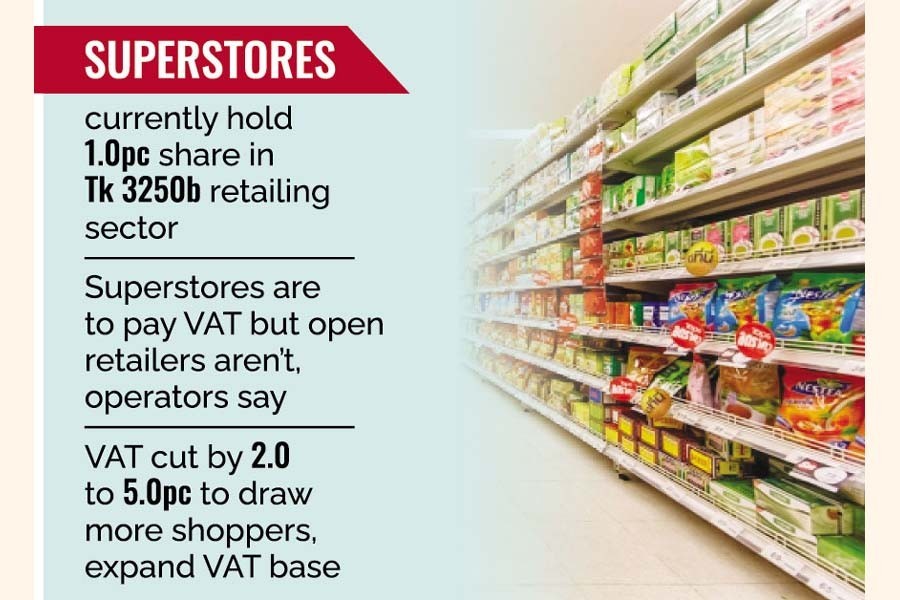Superstore sector seeks equal support to flourish
Industry predicts 5.0 per cent growth, greater potential

Published :
Updated :

Bangladesh's fledging superstore sector, which holds huge potential to generate employment and strengthen the agro-processing industry, faces multiple hurdles for policy paradoxes, insiders say.
Operators seek level playing field in business with equal opportunities to unlock the sector's optimal potential.
"We are working with the lowest margin but are paying the highest rentals, highest electricity bills, high taxes," says Malik Talha, CEO of Unimart, a high-end superstore chain in the country, deploring that the sector is deprived of a level playing field.
Narrating the challenges Nur E Borhan, a senior official of another leading supermarket, Agora, says the price for one-kg beef is fixed by the authority at Tk 700 but, interestingly, the costing is different.
"We have to bear the additional cost of maintaining quality and food safety and we have to pay VAT, but those who sell beef in the kitchen markets don't need to do that. So in selling one-kg beef our margin is much lower than those who need not care for safety or tax, which is not a level playing field."
The sector started off in the country two decades ago but till now its share in the Tk3250-billion retailing sector is around one per cent, whereas in neighbouring countries like Sri Lanka, Pakistan and Myanmar it is over 30 per cent on average.
According to industry people, if this sector can introduce one lakh (.01 million) modern outlets in the country, 1.4 million farmers will be benefitted and 2.7 million people in the supply chain will have employment.
And this amount of Tk 230,000 million will be added to the GDP, Mahadi Faisal, Head of Marketing of Swapno, the largest superstore chain of the country, told the FE.
Swapno alone has 270 outlets out of the total 325 in the country.
"Improper tax policy, and undue intervention by the regulators coupled with bad press resulted in the slow growth of the sector," general secretary of Bangladesh Superstore Owners Association Zakir Hossain says.
Regarding the tax issue he said for selling products, VAT is realized from the superstore but for the same products kitchen- market shops or groceries in the residential area are not paying any VAT, thus depriving the sector a level playing field.
They also cited that after injecting huge investment, well-known superstore-chain Nandan had to wrap up its business having suffered huge loss.
But experts outlined huge potential of the sector itself and at the same time noted that the growth of this sector would contribute to direct and indirect employment.
A standard outlet provides employment to nearly 200 people directly, and along with that, it also creates employment for the sectors involved in the supply chain because these stores are outsourcing products like rice, fish, fruits, meat, vegetables mainly from agro-based sectors.
According to the experts the sector has 5.0-percent growth potential and it can be higher if proper policy support can be ensured.
If the VAT rate is reduced by 2.0 to 5.0 per cent, then more people will shop in superstores, resulting in the expansion of the VAT base, too, the insiders said.
The industry people also complain that they frequently become target of the regulators compared to other players in the retailing sector.
This, they say, causes bad publicity which results in trust deficit which the sector does not deserve after spending 40 to 50 million takas on a single outlet.
"We do not come in the business to sell substandard products after investing such a huge amount of money," says Mr Malik of Unimart.
On the safety issue he says, "It's not that much easy to check hundreds of vendors regularly who are supplying us so we sought the help of BSTI and others to suggest us a mechanism to do so as we are determined to ensure safety and quality."
Experts say the responsibility of ensuring the quality of products-be it in superstores or in open markets-largely lies with the quality-control agencies like the BSTI or Bangladesh Standards and testing Institution.
mirmostafiz@yahoo.com


 For all latest news, follow The Financial Express Google News channel.
For all latest news, follow The Financial Express Google News channel.